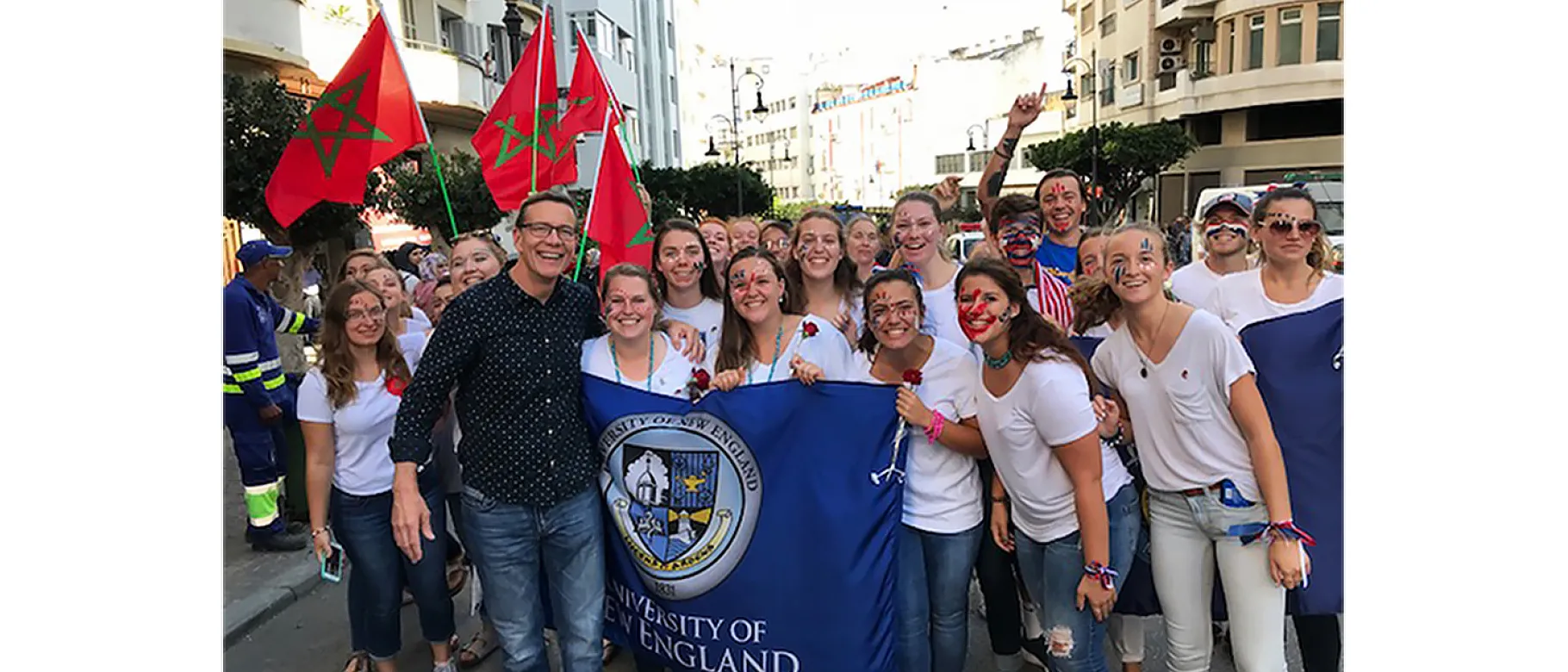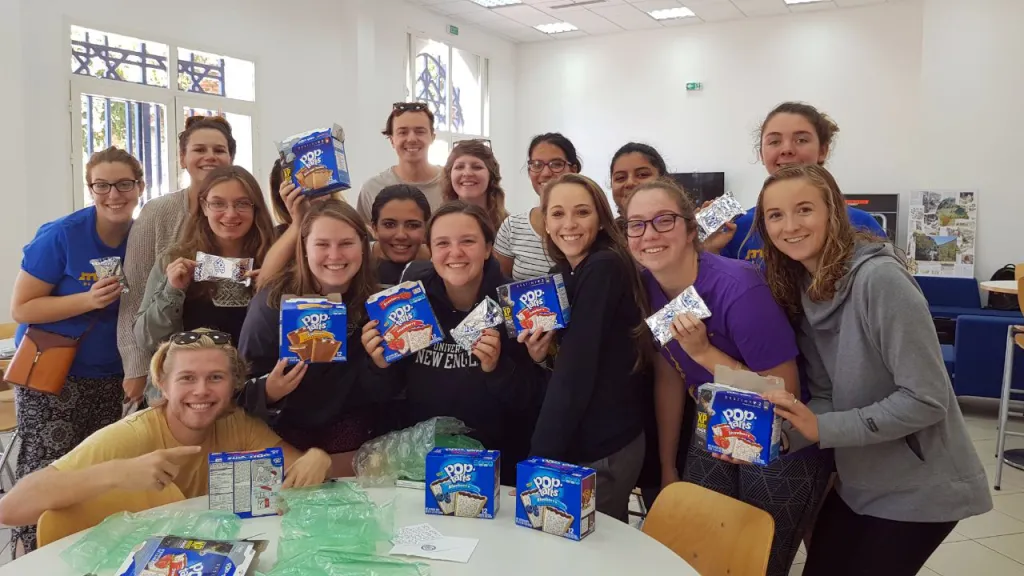UNE President James Herbert goes with Moroccan flow in first visit to Tangier Campus

When new UNE President James Herbert first arrived in Tangier to kick off his first-ever visit to UNE’s Morocco Campus on October 23, he was, as one might expect, exhausted, jet-lagged, and dressed in blue jeans. It was, after all, a nearly 19-hour-long journey across multiple time zones. But to add to the whirlwind experience, Herbert got to Tangier just as the parade and opening ceremonies of the 11th edition of the Tangier International Festival of Student Theater (Festival International du Théâtre Universitaire de Tanger) were getting started. UNE’s Tangier Campus had partnered with the local university that supports the festival, so UNE students were participating in the parade with faces painted, Moroccan flags hoisted, and a UNE banner proudly on display. Without missing a beat, Herbert found the students, who were pleasantly surprised to see him, and together they cheered, clapped, sang and danced to kick off the festival.
Not bad for a spontaneous parade appearance, but Herbert’s true test of adaptability came at the end of the parade route, when he found himself whisked into an official ceremony, conducted in French (one of Morocco’s official languages) and attended by Moroccan dignitaries, celebrities, the Moroccan press and students from all over the world. To his astonishment, after being led to VIP seating, he soon discovered that he was invited to give opening remarks and to present an award to a famous Moroccan actress. Fortunately for Herbert, he converses fluently in French, but the experience, nevertheless, called for some quick thinking on his travel-weary and casually-clad feet.
“Now, I’m still in my jeans,” he said, recounting the experience with a smile. “And here I am in VIP seating. Turns out I was sitting next to the most famous actress in all of Morocco who was getting a big award that night. The next thing I know, I look up, and they’re flashing my name on the screen: ‘Monsieur James Herbert de l’université de New England.’ I had no idea what this festival was, why I was there, or even where I was. I hadn’t slept in two days, and I get up there and I have to offer to this huge crowd of the king’s dignitaries and students from across the globe impromptu remarks in French! You talk about being put on the spot!” he exclaimed, adding with a chuckle, “But it was all good.”
The flexibility called for in Herbert’s first few hours in Tangier was, perhaps more than he knew at the time, a fitting beginning to his Moroccan experience. While the most important goal of his excursion, he said, was to visit the campus and the members of the UNE community there — the study-abroad students, faculty and professional staff — another major component of the trip was meeting with various Moroccan government, business, and academic leaders—not just to thank them for their roles in helping to make the UNE campus in Tangier a reality but to establish and deepen relationships with key individuals should the University ever want to expand its campus or offerings. “We are exploring whether there are any ways of using the footprint of our campus in Morocco to develop further relationships with the academic and business communities in the area,” explained Herbert. This approach, which actively opens doors for the University—doors that could possibly lead down important roads in the future, keeps UNE’s potential fluid and maximizes its adaptability to changing circumstances yet to come.
One association between the University and Moroccan government/business interests that Herbert explored during his trip—and one that has already born fruit (and has planted additional seeds) — is a relationship between UNE and Tanger-Med, a massive cargo port project undertaken jointly by the Moroccan government and private industry. The Tanger-Med port, situated on the Straits of Gibraltar, is currently the largest port in Africa and, upon completion, will be the largest port on the Mediterranean. After meeting with Herbert and UNE’s Vice President for Global Affairs Anouar Majid, the director of Tanger-Med invited UNE’s marine science students studying at the Tangier Campus to go behind the scenes at the port to experience the port’s inner workings, which are usually not open to anyone but port staff. Hebert sees great potential in UNE’s relationship with Tanger-Med, particularly for the University’s marine science and business programs. According to Herbert, Morocco grows much of the same winter produce that is currently imported to the U.S. from Chile. Considering that it is a “straighter shot” from Tangier to Portland, Maine, than from Chile, Herbert put officials from Tanger-Med in touch with the Port of Portland. A potential Tangier-Portland shipping relationship would further the horizon for UNE students studying business, marine affairs, or marine entrepreneurship, he believes.
Herbert had UNE’s marine sciences programs in mind again at another meeting he attended while in Morocco — one with the president of Larache College, Professor Bouchra El Moumni. Located on the Atlantic coast between Tangier and Morocco’s capital of Rabat, Larache, a relatively new college that is growing rapidly, conducts significant research in aquaculture and marine sciences. As the result of his meeting with Herbert, El Moumni is exploring the idea of joining with UNE and two Icelandic universities, the University of Akureyri and Holar University, in the creation of a new Professional Science Master’s Program in Ocean Seafood Systems, scheduled to launch next fall.
Clearly, positioning the University and the Tangier study-abroad program in the most flexible footing possible was of great concern to Herbert during his five-day stay in Morocco. But it was the adaptability of UNE’s Tangier Campus students that stood out most to him when recounting his trip. Noting that most of the students had never before been out of the U.S. and that for some of them their travel to Morocco was their first time on an airplane, Herbert said that he was “absolutely shocked” at how well-adjusted and, in fact, adventurous, the students are. “They get plopped down in the middle of Tangier Morocco, one of the most exotic cities that couldn’t be more different from Biddeford , Maine,” he said, “and you might expect that they would be scared out of their minds — that they would want to just stay in their cozy little campus.”
“But the opposite is the case,” he said with eyes lit up. “They were so adventurous. They had learned in a few short weeks enough conversational Arabic to get out on the street and haggle with the vendors; they know where to get the best jelly doughnuts, where the best coffee shops are. They go all around the city. They are just incredibly adventurous. I was so impressed by how fully they were taking advantage of the experience.”
With a sense of awe and pride, Herbert also shared that the UNE students in Morocco had taken the ferry to Southern Spain to explore, had climbed the highest peak in North Africa—a 14,000-plus mountain in the Atlas range — and had trekked through the Sahara desert.
Perhaps it is easier to understand the ease with which the students embraced their Moroccan experience after hearing Herbert describe the campus. “I’ve seen pictures, and it is beautiful in pictures, but it does not do it justice,” he said. “It is stunning! I mean, it is absolutely stunning! The materials and the craftsmanship of the buildings are just simply amazing. And the most beautiful gardens — hand manicured with flowers blooming everywhere and everything just perfect.”
Beautiful though it is, life in Tangier is unlike anything the students are accustomed to — full of “different sights, different sounds, different smells,” Herbert explained. But not one of the students was frightened by the foreign surroundings, something Herbert largely credits to the amazing Morocco Campus staff, who create “a tight-knit, family community with an incredible sense of support” and who provide the students with a creative and in-depth orientation to life in Tangier. In fact, all the students expressed that they were extremely pleased with their decision to spend a semester in Morocco. “Every single student I spoke to said it was a life changing experience,” Herbert reported. “They said that it absolutely exceeded expectations and that they loved it. They raved about the academics. They said the professors were excellent. And they just couldn’t say enough about the cultural experience.”
A testament to the students’ ability to acclimate to such different surroundings, he said, is that when asked about what they missed most from home, the majority of students, replied “nothing.” However, those who did have an answer to the question were in agreement as to what they missed the most—an item that took Herbert by surprise: Pop-Tarts! With a campus cook who keeps homemade cookies on hand for them (in addition to preparing them three gourmet meals a day) and an abundance of exquisite French pastries available to buy on nearly every street corner of Tangier, the students’ longing for Pop-Tarts was dumbfounding to their president. But in the spirit of the trip, Herbert knew to go with the flow. Upon his return, he promptly shipped out a large package of assorted Pop-Tarts, destined for the Tangier Campus.
It seems that Herbert’s trip to Morocco exuded the spirit of being ready for anything, for seeking out new partnerships and experiences, and for embracing the unknown and unexpected. “What [my experience in Morocco] illustrates, I think,” he said, “is that to make the most of these situations, you have to be very flexible. If I had gone over and had been a high maintenance kind of person or the kind of person who always has to follow protocol, it would not have gone as well. Adaptability is key.”
Whether it’s finding yourself (on zero hours of sleep and informally dressed) making an impromptu speech in French to foreign dignitaries; exploring new connections and relationships to maximize your potential; or haggling in Arabic with a street vendor over the price of a jelly doughnut, it seems that Morocco inspires its visitors to be ready for anything. You just never know what golden opportunities (or packaged breakfast pastries) might “pop” up there.




